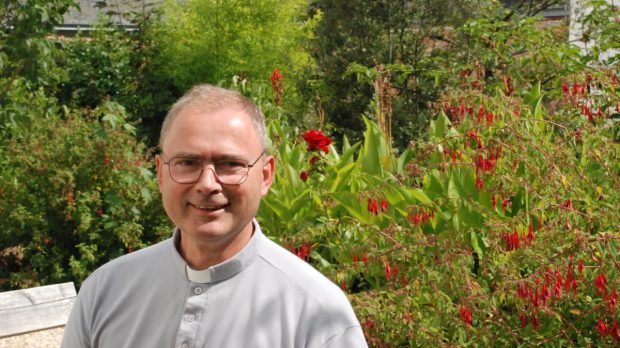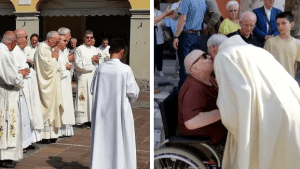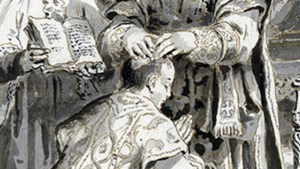Lenten Campaign 2025
This content is free of charge, as are all our articles.
Support us with a donation that is tax-deductible and enable us to continue to reach millions of readers.
How can someone see the hand of God in the ordeal of widowhood? How does a vocation to the priesthood germinate when one has been a husband and father?
Fr. Bruno Raffara, 57 years old, ordained for the diocese of Angers on June 28, 2020, took some time to answer these questions. “I spotted things and only now do I make the connection,” he says with a smile. Is he speaking of signs? “Everyone is free to believe in them or not,” he says, preferring to speak of “clues.” And there have been many of them in Fr. Bruno’s life.
Claire and Bruno were nearly 20 years old when they met in 1984 at a volunteer meeting in Lourdes. They shared the same faith, a foundation that would sustain them to the end. They got married on July 26, 1986, in Cholet (a city western France), where Claire is originally from.
She was a teacher and Bruno was an economics professor, and they were involved with the “Word of Life” community of the Charismatic Renewal. The couple lived in Corrèze for six years before settling in Sarthe, where family life, work, and parish commitments punctuated their daily lives.
In 1999, the family moved to Saumur, but Claire’s illness appeared soon after. Friends, religious communities … the couple felt surrounded by support. “I learned afterwards that many people had prayed for her,” he recalls. The bishop of Angers, Bishop Jean-Louis Bruguès, visited her a week before her death. Claire died on January 25, 2002. They had three children, aged 13, 11, and 7.
Although his grief was immense, Bruno had to manage daily life with the children. Quite quickly, he noticed a new inner state: “I felt as if I had been dispossessed of my vocation. I no longer needed to take care of Claire; she was in heaven. All of a sudden, my hands were empty.” He turned to the Lord in prayer: “What should I do?” Of course, his first responsibility for his children was obvious.
A call from the bishop
Nine months after Claire’s death—”a symbolic time,” he assures us—the idea of the priesthood began to mature. Shortly afterwards, as he was leaving a Mass, Bishop Bruguès asked Bruno, “Have you ever thought of putting yourself at the service of the Church?” Since he was actively involved in his parish, replied that he was already there. The bishop mentioned the diaconate. Raffara replied that he was thinking of the priesthood, but that at that moment the possibility of remarriage remained open. The bishop concluded, “When you’re sure that you’re not called to remarry, come back to see me,” and suggested that he seek guidance in his discernment. These “clues” were the first of many.
One summer, during a family festival in Sainte-Anne-d’Auray, the location of a famous shrine to St. Anne, Raffara came across a passage from the Book of Samuel: “I will raise up for me a faithful priest who will act according to my heart and my desire.” “How can I not see this as a sign?” he wondered, especially since St. Anne was celebrated on July 26, the day of their wedding.
The years passed, and the children grew up. In Raffara’s heart, his discernment slowly became clearer. In December 2013, he asked to meet the bishop of Angers, Bishop Emmanuel Luc Jean-Marie Delmas, who had arrived a few years earlier. The bishop told him, “If you hadn’t come, I would’ve taken the initiative to speak to you about it.”
On February 11, the feast of Our Lady of Lourdes, he was offered the opportunity to enter the seminary in September. But Bruno’s youngest daughter was still a student. And how could he reconcile the seminary with his work? He took time to think it through. “Everything was resolved in eight days. I saw my school principal on February 18, the feast of St. Bernadette. I got a leave of absence and job security.”
Wisdom of the Church
In September 2015, Bruno Raffara became a seminarian. But, rather than a classical course at the seminary in Nantes, he joined the faculty of theology in Angers while also helping in a parish on a permanent basis. As for the bishop, he accompanied Raffara, but “not too closely.” “This is a wise measure to leave freedom to the seminarians. Discernment is entrusted to other people.”
At first, the children felt uncomfortable with their dad becoming “a public figure.” But over time they “got used to it,” says Fr. Raffara, who was ordained a priest on June 28, 2020, and is now a parish priest near Cholet. The faithful are delighted with his presence: “I experience the same things as they do. They encourage me to take vacations, to rest and to see my children,” says the priest.
Now, thinking back to the priests of his youth who invited him to Lourdes, and to his teaching career that made him comfortable in front of the public, Fr. Raffara gives thanks for God’s gentleness in this unexpected vocation. “He had prepared me,” he says.



